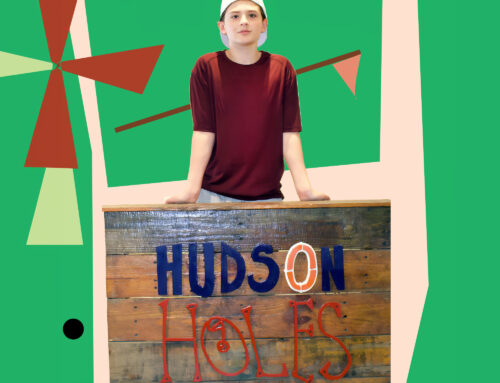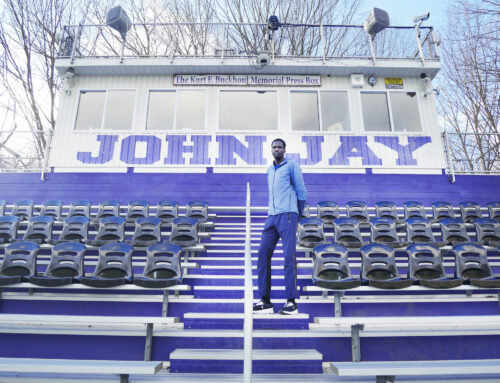We use terrible puns because death makes us uncomfortable. Yet Bruce Reisdorf deals with it for a living, and he loves his job. Those who know him say he’s the last guy to let you down (sorry!), and we find out why.
As Benjamin Franklin famously said, in this world, nothing is certain except death and taxes. We deal with taxes regularly and they even come up in polite (and not so polite) conversation. But death is a topic that many of us try to avoid. Even though it happens to all living beings, we’re uncomfortable with it. It’s so…final. Yet those who work in the industry provide our community with an essential service – one that must be done with precision and grace during a time of great upheaval in a family’s life. For our very first Coffee Connection, we sat down with Licensed Manager Bruce Reisdorf at Clark Associates Funeral Home to chat about life, death and everything in between.
It often goes like this: Bruce Reisdorf meets with family members of the recently deceased. Their conversation is somber, serious as they review the next immediate steps. It may take minutes or hours for the family to make their decisions, but Reisdorf doesn’t mind – he holds their hand every step of the way.
Towards the end of the meeting, Reisdorf has developed a rapport with the family members. He’s entered their lives at one of the most difficult times and has quickly gained their trust. Once the family has made those difficult decisions, they sometime shift into a “first date” conversation. In the early 2000’s, the topic du jour was “Six Feet Under.”
“We’d wrap up the meeting and people would say, ‘have you ever watched “Six Feet Under,”’ and the whole dynamic of the meeting would change,” Reisdorf remembers. “We’d start talking about TV and the crazy funeral home family. But I’ll never forget this one time where the son of the deceased asked me, ‘What do you like about the show?’
“So, we talked about the show, specific episodes and things like that,” he continued. “He thanked me for my opinion and then told me that he worked for the show! A couple of weeks later, he sent me a box of swag – a t-shirt, calendar and other really cool stuff. It was great to talk to him, and that was a fun surprise!”
Helping people in their time of need
While Reisdorf doesn’t regularly receive a box of swag as a thank you for doing his job, he is often thanked for helping a family get through the most difficult days of their life. He likens his job to that of a “Dutch Uncle,” which, according to the Oxford Dictionary is “a person giving firm but benevolent advice.” He and his colleagues feel as though they become a part of the family. They’re there for one of the worst parts – witnessing families discuss intimate details about their pain.
“When the funeral is over and we’re walking away, or when the family comes in a week later to sign the final paperwork, they’ll shake my hand or give me a hug and say, ‘thanks for everything, we couldn’t have done it without you,’” he says. “That’s the best part. That’s why I do this.”
The job requires many hats
Funeral directors play many roles all at once – they’re serving the role of psychologist, family mediator, grief counselor and event planner. In fact, obtaining a degree in mortuary science involves taking courses in everything from anatomy, chemistry and microbiology to counseling, business management and law. They also learn about various religious customs and ethics.
“The best thing that we can do is to be a good listener,” he says. “Families are obviously upset when they come to us, and they have ideas about what they’d like. So, we listen and help them structure a service that’s meaningful for them, whether they’re very religious or not. We take all of their ideas, and within reason, put them into a meaningful service that helps them with the grieving process.”
Death waits for no one
Being in a profession that requires you to be on call means leaving during the middle of a birthday party, a family holiday celebration or your child’s recital/playoff game. It’s not easy on anyone when these calls come in, but having an understanding and supportive family definitely helps.
“We’re available 24 hours a day, seven days a week,” says Reisdorf. “It’s a personal sacrifice that we make – we miss a lot of holidays and birthdays. As soon as the telephone rings, your holiday is over because you realize it’s over for the family who is on the other end of the phone. It’s a service that we perform for the community. We’re try to help the family get through the most difficult days of their life.”
Those difficult days are even worse when parents are burying their child. Reisdorf, whose sister died at a young age, is passionate about supporting these families. He encourages them to seek support from a nationwide group called Compassionate Friends who meet locally in White Plains. He’s even attended a meeting so he can speak from experience about the supportive nature of the group.
You can take it with you
One of the more interesting parts of Reisdorf’s job is what people (or their family members) choose to take with them to the grave. The most common item? Sparky’s ashes.
“People have a real attachment to their pets,” he says. “Your pet loves you unconditionally, no matter what. And he’s always happy to see you when you come home at the end of every day.”
Some other frequent requests include golf clubs, fishing poles, baseball hats, sports jerseys and camouflage hunting outfits. He’s also had some requests for food items like pasta and pasta sauce, a full baseball uniform from a fantasy camp and even a carton of cigarettes.
“One experience I’ll never forget was with a man who was a big golfer,” Reisdorf remembers. “When his golf buddies came to see him during visiting hours, they each knelt down by the casket. Unbeknownst to us, they did that to secretly put a golf ball in his casket. On the day of the funeral, his golf friends were his pallbearers, and as we’re carrying the casket into the church, we had to put it at an angle. Suddenly, we heard bang, bang, bang, and his friends began laughing. They knew the sound was their golf balls rolling around the bottom of the casket!”
Life is about living
While his work is rewarding, Reisdorf also makes sure he takes time to unwind. His preferred method? Exercise, particularly cycling.
“I’m an avid cyclist and a member of the Westchester Cycle Club,” he says. “I put a lot into to my work, and bike riding serves as a huge stress release. Whether I’m going to the gym or riding with friends, that’s my relaxation.”
Gia Miller is an award-winning journalist and the editor-in-chief/co-publisher of Connect to Northern Westchester. She has a magazine journalism degree (yes, that's a real thing) from the University of Georgia and has written for countless national publications, ranging from SELF to The Washington Post. Gia desperately wishes schools still taught grammar. Also, she wants everyone to know they can delete the word "that" from about 90% of their sentences, and there's no such thing as "first annual." When she's not running her media empire, Gia enjoys spending quality time with friends and family, laughing at her crazy dog and listening to a good podcast. She thanks multiple alarms, fermented grapes and her amazing husband for helping her get through each day. Her love languages are food and humor.








